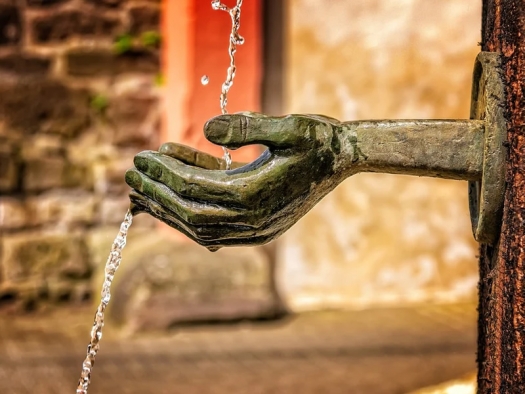HandsSculptureCatchingWater.jpg

Photo by Peter H (Tama66) / Pixabay License
Water is in so much abundance on this planet.
In developed countries, it’s easy to think that we can use as much of it as we want, and as often as we want – and that there’s no way we can run out.
It’s true that Earth does have a lot of water. Almost three quarters of the globe is covered in it!
But unfortunately, our water is not limitless. In fact, only 1% of the Earth’s water is freshwater that we can drink and use for other things.
At the rate we’re going in how we treat our precious water resources, we may have less and less of it not too far in the future.
I don't want my generation – or any future generation – to see our water supply spoiled and undrinkable, only available to developed countries, the elite, and the privileged.
Many developed countries in arid areas are already feeling the effects of this.
Some sources even say that in the next five to ten years, billions of people living in dry, desert regions will be suffering to procure water and it will no longer be a free source.
Can you imagine that?
Even if you can’t (or if you can), all this is happening because of more than a few too many destructive human habits and a lack of healthy, supportive resources in certain countries.
Such as:
Poor sanitation.
It’s alarming to think that our water is becoming wasted simply because of poverty.
Some regions and governments don’t care enough about the health of their own people to protect the water resources near them, let alone to provide them access!
It may shock you to learn that poor sanitation (lack of plumbing and draining away of human waste) is a big factor in water loss around the world, especially in struggling developing countries.
Worse: this poor sanitation is the cause of disease, sickness, and even further poverty in some places, with 80% of illness in the developing world related to poor sanitation!
This needs to change.
Increasing drought due to environmental degradation.
Not only are our water resources becoming tainted by our own carelessness and destructive activities, other pollution and human actions are affecting the water cycles on this planet, making it a lot dryer and warmer in some places.
What this means: more droughts, and less water. We’re already starting to see a lot of this already – and again, in developing countries especially.
If you watched The Need To GROW, you may remember how much water holding capacity healthy soil has!
This is one major reason why regenerative agriculture is so critical to life on Earth. Much of our water issues are really soil issues.
Chemical dumping by major companies.
The worst thing about this one is that it’s not just happening in developing countries.
It’s also happening right here in developed countries, including America, and right under our very noses.
Too many companies are given the green light to dump their chemical waste stream right into our precious fresh water sources: including our freshwater lakes and rivers!
Not to mention our chemical agriculture, which sprays chemicals right in front of our eyes that end up in our rivers, streams, lakes, and straight in the reservoirs and water tables we directly drink from.
Sure, to many of us, the problem of water seems like it’s a far away one, someone else’s problem for now, if you live in one of a few lucky countries.
But data is suggesting it’s only a matter of time before the problem with our water reaches all our doorsteps, and becomes all our problem.
Want to get involved or make a difference? Look into groups like the World Water Council, the Pacific Institute, or Clean Water Action to learn more about how to protect the world’s water.
For more information, visit the Earth Conscious Life website.


